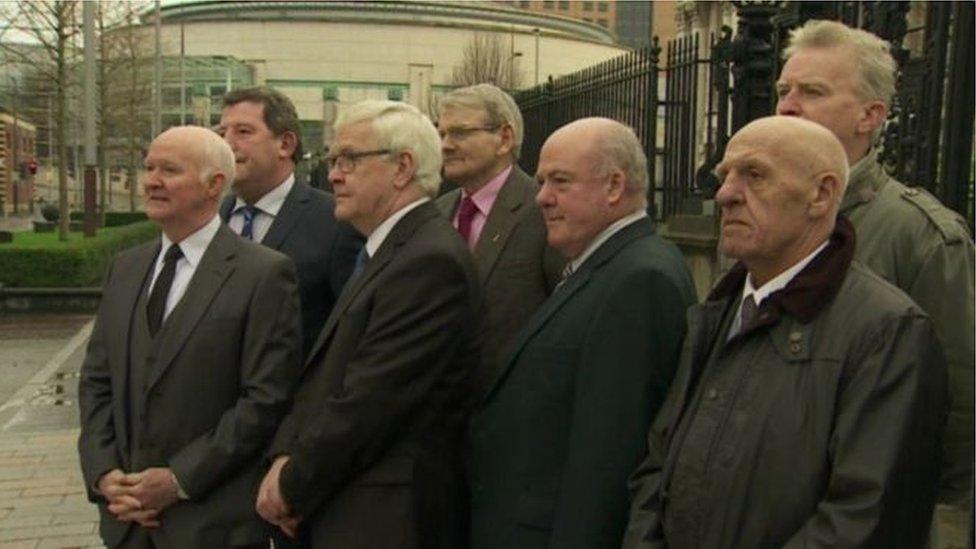'Hooded Men': PSNI 'wrong not to investigate torture claims'
- Published
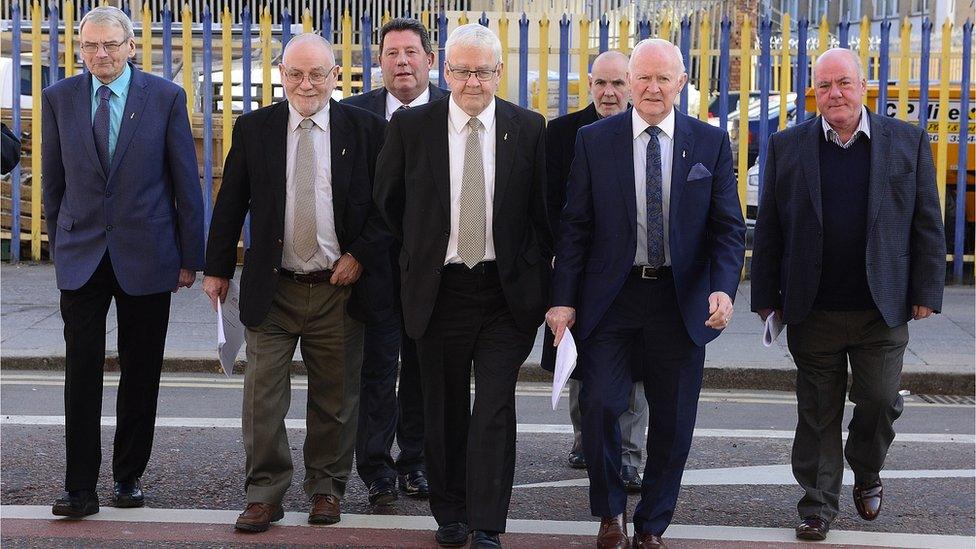
The men were held without trail in 1971
The Supreme Court has ruled that the Police Service of Northern Ireland (PSNI) was wrong not to investigate allegations that 14 men were tortured in Northern Ireland in 1971.
The men, known as the 'Hooded Men', were interned without trial during the Troubles.
The judges said the decision by the PSNI, made in 2014, was "irrational".
The court also said the men's treatment was "deplorable" and was "deliberate policy".
However, the Supreme Court did not accept that the PSNI was not sufficiently independent, external to carry out a new investigation into the "Hooded Men" case.
Lord Hodge said: "In our view, it has not been established that the LIB (Legacy Investigations Branch) is not capable of carrying out an effective investigation on the basis either of institutional or hierarchical connection or that it is not capable of conducting an investigation with practical independence.
"There is nothing to suggest that it would not be possible to assign appropriate officers of the PSNI to carry out any further investigations to a proper standard."
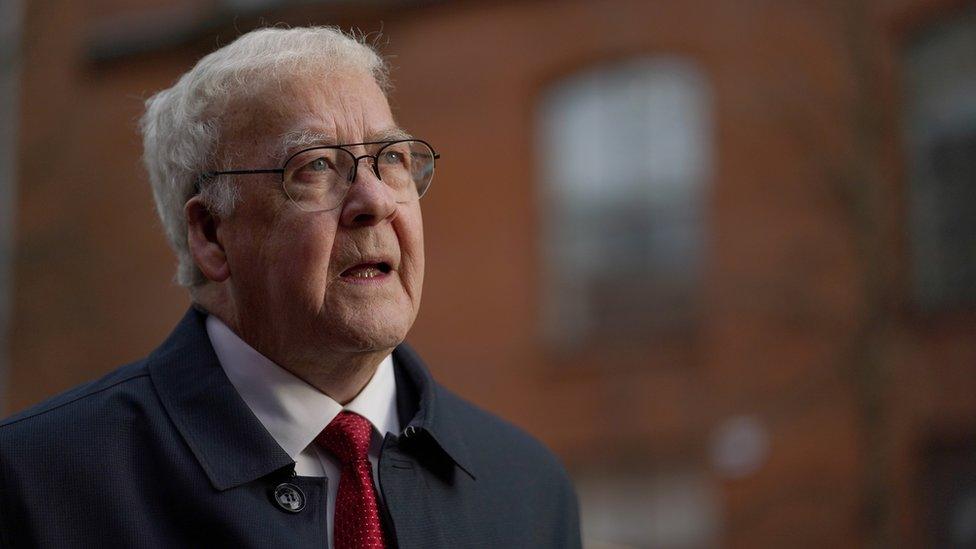
Francis McGuigan said their case now needed to be investigated

Key conclusions:
The PSNI was not under an obligation to investigate the authorisation of the ill-treatment of the 'Hooded Men' under article three of the European Convention on Human Rights, which prohibits torture
The Chief Constable did not create a "legitimate expectation" that the PSNI would investigate those responsible for authorising the ill-treatment of Mr McGuigan and Mr McKenna, two of the 'Hooded Men'
The PSNI decision taken in October 2014 not to investigate the statements in the Rees Memo, a correspondence sent by then-Home Secretary Merlyn Rees to the Prime Minister James Callaghan in March 1977, which said the government had authorised the use of torture methods, was "based on a seriously flawed report" and was "therefore irrational", so falls to be quashed
One of the men, Francis McGuigan, said it had been a frustrating process to get to this point.
"It's been rough - we're seven years in and out of court and we seem to win each time we go into court, but we seem to get no further forward," he said.
"I'm hoping now… it can go nowhere else, we've appealed to the highest court in the land and we won there as well.
"So I'm looking forward now to the investigation into it, the results of the investigation into it and hope that eventually the truth comes out that the British government sanctioned torture against its citizens."
'Access to justice'
His solicitor Darragh Mackin described the decision as "a landmark victory".
Mr Mackin added that the government's legacy proposals should not affect a police investigation into what happened to the men.
"That legislation is not only about an amnesty, it goes much beyond that, it is about removing an individual's access to justice," he said.
"Today is exactly why the British government are bringing about such proposals."
He added: "Given that we're talking about the crime of torture, no proposal that the British government seeks to advance would any event stymie such an investigation."
Deirdre Montgomery, whose late father Michael was one of the "Hooded Men", said she was "absolutely elated" for her family and for her "father's memory".
She told BBC News NI's Evening Extra programme that she received therapy for what happened and her "children have been affected" by the legacy of the events.
“I believed they weren’t going to let us out alive”
The 'Hooded Men' have long called for a new, independent investigation into their treatment, saying there were subjected to "deep interrogation" by the Army during their detention.
The men said they were forced to listen to constant loud static noise; deprived of sleep, food and water; forced to stand in a stress position and beaten if they fell.
They also said they were hooded and thrown from helicopters a short distance off the ground, having been told they were hundreds of feet in the air.
In 2014, an RTÉ documentary unearthed fresh evidence, but the PSNI decided there was not enough evidence to warrant an investigation.
In 2019, Lord Chief Justice Sir Declan Morgan, Northern Ireland's most senior judge, said their treatment "would, if it occurred today, properly be characterised as torture".
Another of the three judges at the Court of Appeal in Belfast dissented with that conclusion.
The court was ruling on an appeal by police against a ruling that detectives should revisit the decision to end their inquiry.
In a statement, Assistant Chief Constable Jonathan Roberts said the PSNI acknowledged Wednesday's court judgment and welcomed "the clarity it brings to some complex legal issues".
"We recognise the difficult realities that victims, families, friends and broader society continue to deal with as a result of our troubled past," he said.
"We will now take time to study today's judgment around these complex legacy issues in detail and we will carefully consider its implications for future legacy investigations.
"If we are to build a safe, confident and peaceful society, then we must find a way of dealing with our past and we are committed to playing our part in that process."
1972 shooting
The Supreme Court also looked at a second Troubles-era case - the shooting of Jean Smyth-Campbell.
Ms Smyth-Campbell was 24 when she died after being shot as she sat in a car on the Glen Road in west Belfast in 1972.
Her death was initially blamed by police on the IRA, but an undercover Army unit has since been linked to the shooting.
In March 2019, the Court of Appeal in Belfast ruled that the PSNI would not be independent in carrying out a new investigation into the death.
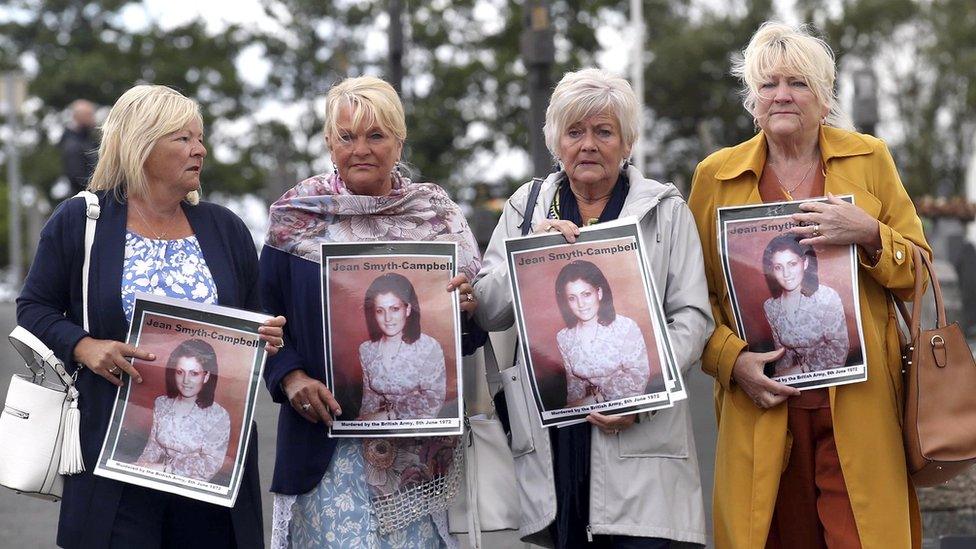
Jean’s sisters Margaret McQuillan, Ann Silcock, Pat Smith & Sheila Denvir, seen here in 2020
On Wednesday, the Supreme Court found that the proposed investigation "would not have been effective in the particular circumstances of that case because the Chief Constable of the PSNI had failed to explain to her family and the public, and when faced with the judicial review challenge, the court, how he proposed to secure the practical independence of that investigation".
In a statement following the ruling, Ms Smyth-Campbell's sister Margaret McQuillan, said: "Our family has today been vindicated by the ruling of the British Supreme Court.
"They have confirmed the Police Service of Northern Ireland failings in the case. The PSNI have already apologised for these failings. We believe, however, that the PSNI cannot be trusted, now or ever, in any legacy case, by any family."
In June 2019, the PSNI asked former Bedfordshire chief constable Jon Boutcher to investigate the killing.
Referring to this case, the assistant chief constable said the PSNI welcomed the "clear legal ruling" that the PSNI did not have any legal obligations under article two of the European Convention on Human Rights to investigate the case.
"We will now carefully consider the judgments and their impact on the legacy caseload," Jonathan Roberts added.
'Justice delayed'
First Minister Paul Givan said the case of the 'Hooded Men' and other Troubles incidents showed the need to "find a way forward that allows us to provide that truth, also that justice, and make sure we can move into the future".
"Whether it's this case or whether it's other cases that happened within Northern Ireland dealing with the past is something that needs to be resolved. It continues to have implications for the present and for future generations.
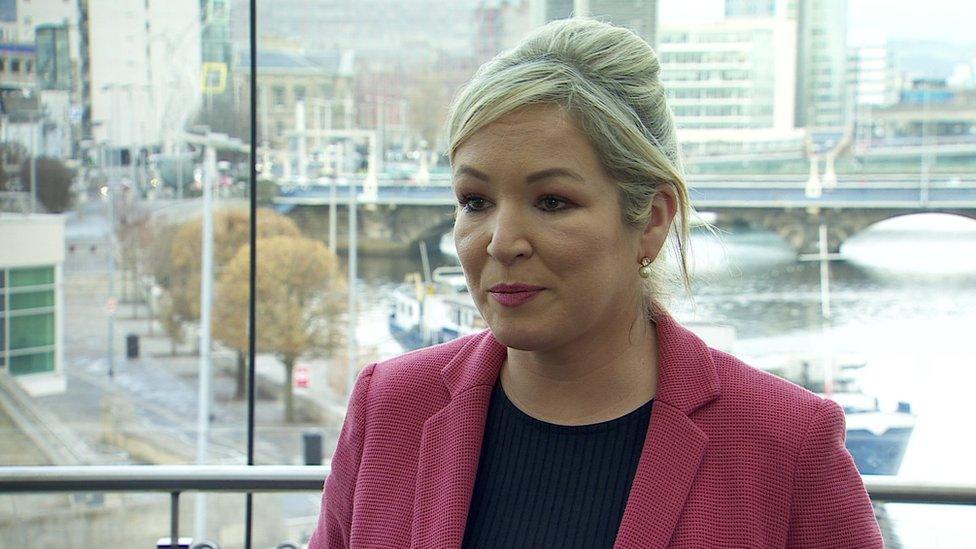
Deputy First Minister Michelle O'Neill said the PSNI should investigate the case
Deputy First Minister Michelle O'Neill said she welcomed the ruling and "it was over to the PSNI to do their job".
"They should have investigated this. These men have been tortured, it's been confirmed internationally, everybody recognises that is the case."
Grainne Teggart from Amnesty International described the 'Hooded Men' decision as a "victory for justice".
She said police had "shamefully added to the trauma already inflicted and has delayed the truth, justice, and accountability to which these men are entitled".
Related topics
- Published20 September 2019

- Published15 February 2017
